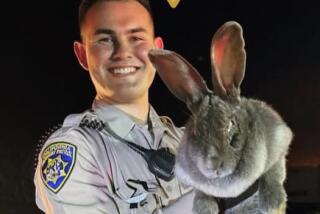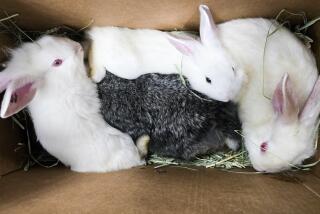Countywide : Rabbits Are Not for Pet-Hoppers
- Share via
Tabby likes to kiss his owner’s nose and toes, snuggle up with Ethel the cat and hop up and down the stairs of his Santa Ana home. The lop-eared, calico rabbit, like many pet rabbits, uses a litter box and lives inside the house--not in a back-yard hutch.
“They’re wonderful, very sociable animals,” said Tabby’s owner, Karen Lanigan. “He gives so much back.”
When Lanigan got Tabby a year ago, she said she made a commitment to make him a permanent member of the family. She is not alone. Other members of the Orange County chapter of House Rabbit Society said owning these domesticated animals is not a short-term commitment.
Members of the House Rabbit Society, which educates people about the proper care of rabbits and rescues abandoned rabbits, say that at Easter people buy bunnies without realizing that they will grow up to be adult rabbits that need love, care and patience like any other house pet.
“Often they decide later that Fluffy is no longer cute then they dump them in a park or a shopping center and abandon them or they take them to a shelter,” said Laura Shortall, manager of the local chapter.
People usually do not realize that they can train rabbits to use a litter box and can spay or neuter them, and that they make good companions, said Laurie Gigous, the assistant chapter manager who lives in Fullerton.
Lt. Marie Hulett-Curtner, spokeswoman for Orange County animal control, said people often impulsively buy not only rabbits, but also chicks and ducklings at this time of year. “If you’re going out (and buying) on impulse for the holidays, just get a stuffed animal instead, because we’re talking about a living creature,” she said.
She also said stores that do not sell rabbits, chicks and ducklings all year may not legally sell them at Easter.
Irvine prohibits the sale of these animals at any time, said Carl Pagano, superintendent for Irvine Animal Services. The city’s animal shelter also will not make rabbits available for adoption from March 20 to April 8.
House Rabbit Society members also said that people who want a rabbit should consider getting an adult animal, since younger ones can be mischievous while going through the teen-age years (from about 3 months old to 1 1/2 years).
The local House Rabbit Society has about 50 rabbits in foster homes available for adoption. For a $45 donation, new owners, who are screened, get a healthy, litter box-trained rabbit that has been spayed or neutered.
“The reason we screen is we’ve raised these rabbits and they live in our houses and we’ve come to love them,” Gigous said. “It’s almost like giving up a child. We want them to have the best home.”
Caring for Rabbits
* Food: Limit to only fresh rabbit food pellets, fresh water and alfalfa, oats or barley. Only give small quantities of treats, vegetables (carrot tops, broccoli, mint), fruits (apples and bananas) and grains (rolled oats), to rabbits 3 months and older.
* Litter: Do not use cedar or pine shavings in litter box or cage, since such materials can cause liver disease. Only use dust-free, organic litter.
* Neutering: Male rabbits should be neutered at 3 1/2 months old; females at 4 months of age.
* Grooming: Groom rabbits with a flea comb and brush away excess hair. Rabbits shed their coats four times a year.
* Cage: If using a cage, make sure it is roomy and cover part of the cage floor with cardboard, wood or carpet for comfort.
* Privacy: Offer a quiet, safe retreat for rabbits to hide in and to be alone, such as a cardboard box or untreated wooden box.
* Hot line: House Rabbit Society (714) 254-8685
Source: House Rabbit Society
Los Angeles Times
More to Read
Sign up for Essential California
The most important California stories and recommendations in your inbox every morning.
You may occasionally receive promotional content from the Los Angeles Times.













